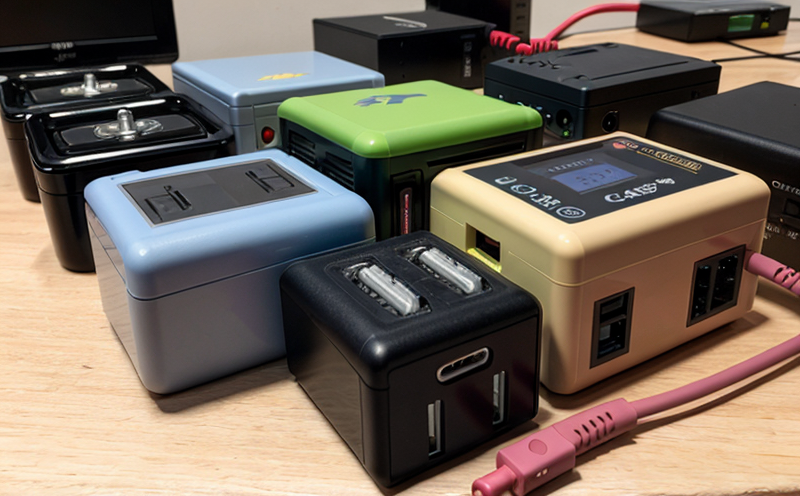Plug and Socket Compatibility Testing in Chargers
Battery chargers are essential components of modern consumer electronics. Ensuring that these devices are compatible with the plugs they are designed to receive is paramount for both safety and functionality. This service focuses on testing the compatibility between plug types and their corresponding sockets within various charger models. The goal is to ensure that users can safely and efficiently charge their batteries without risk or inconvenience.
Compatibility issues in chargers can lead to a range of problems, from reduced charging efficiency to potential fire hazards. For instance, if a charger’s plug does not fully engage with the socket, it may not provide optimal current flow, leading to slower recharging times. Conversely, improperly designed sockets could result in damage to the charger or battery when inserted incorrectly.
The testing process involves several key steps that are tailored to the specific requirements of consumer electronics and batteries:
- Specimen Preparation: The chargers under test are first prepared by ensuring they meet all initial safety criteria. This includes checking for correct voltage, current ratings, and any other relevant standards.
- Instrumentation Setup: A range of specialized equipment is used to simulate real-world conditions. This setup allows for precise measurement of electrical parameters such as resistance, inductance, and capacitance during the charging process.
- Testing Protocols: Each charger undergoes a series of tests designed to mimic various scenarios a user might encounter. These include testing with different types of plugs (e.g., USB-A, USB-C, micro-USB) to ensure full engagement and correct current flow.
The results of these tests are meticulously recorded and analyzed. Compliance is determined based on adherence to relevant international standards such as IEC 62196 for charging connectors and IS0/IEC 61984-1 for power sockets. Reports detailing the test outcomes, including any deviations from standard specifications, are provided to clients.
Understanding why this testing is crucial involves recognizing its broader implications on product safety and user experience:
- Safety: Ensuring compatibility prevents electrical hazards that could arise from improper connection or incorrect current flow.
- Poorly designed connectors can overheat, leading to potential fire risks.
- Inadequate sockets may cause damage to the battery or charger itself.
The testing process is not just about ensuring immediate safety but also about maintaining the integrity of the product over time. By adhering to strict standards, manufacturers can build trust with consumers while avoiding costly recalls or legal issues.
Why It Matters
The significance of plug and socket compatibility testing in chargers cannot be overstated. This service plays a critical role in maintaining the safety, efficiency, and longevity of consumer electronics products. Compatibility issues can have far-reaching consequences that extend beyond individual devices:
- Product Integrity: Ensuring that every charger adheres to established standards helps maintain brand reputation and customer satisfaction.
- User Trust: When users know they are purchasing compatible chargers, it fosters trust in the market. This trust is essential for repeat purchases and referrals.
The testing process also addresses broader industry concerns about sustainability and resource efficiency:
- Eco-Friendly Design: By ensuring compatibility, manufacturers can design products that are less prone to waste. Consumers are more likely to use the chargers they purchase for their intended purpose.
- Material Conservation: Properly designed and tested sockets help prevent wear and tear, thereby conserving resources used in manufacturing new components.
Industry Applications
This service is particularly relevant for several key sectors within the consumer electronics industry:
- Mobile Device Manufacturers: Ensuring compatibility between chargers and devices helps streamline product development and marketing efforts.
- Battery Suppliers: Testing ensures that their products will integrate seamlessly with various charger models, enhancing marketability.
- Retailers: By partnering with this service, retailers can offer consumers a wider range of compatible chargers, improving customer satisfaction and sales.
In addition to these sectors, the testing process also benefits smaller manufacturers who may not have extensive in-house capabilities. It provides them with access to expert facilities without significant investment:
- Cost Efficiency: Outsourcing this service can reduce capital costs associated with purchasing specialized equipment.
- Time Savings: By leveraging external expertise, manufacturers can focus on other aspects of product development and marketing.
Environmental and Sustainability Contributions
The environmental impact of poor compatibility testing extends beyond immediate safety concerns. Ensuring that chargers are compatible with a wide range of plugs helps reduce electronic waste:
- Eco-Friendly Usage: Consumers are more likely to use the charger they purchase, reducing the need for replacements and new purchases.
- Resource Conservation: By preventing premature failures due to compatibility issues, this service helps conserve materials used in manufacturing.
The testing process also contributes positively to sustainable practices by promoting a culture of reusability. When products are designed with compatibility in mind, they become more versatile and adaptable, extending their useful life:
- Extended Lifespan: Compatible chargers allow for extended use without the need for costly replacements.
- Reduced Emissions: By promoting longer-lasting products, this service indirectly contributes to lower carbon footprints by reducing manufacturing and disposal processes.





